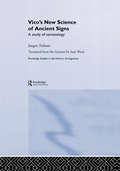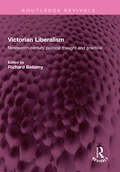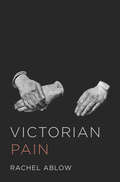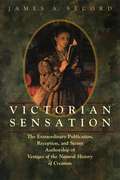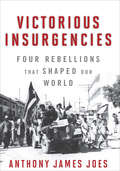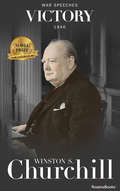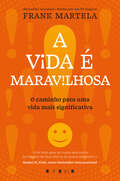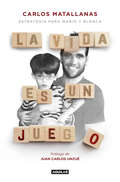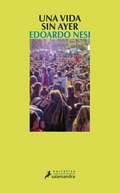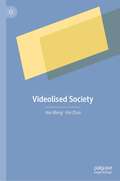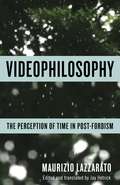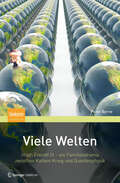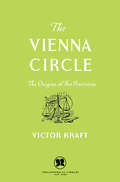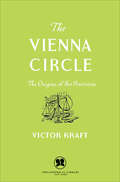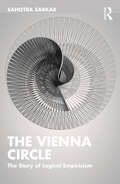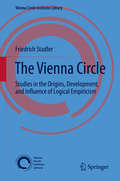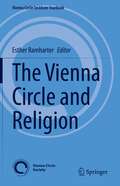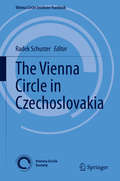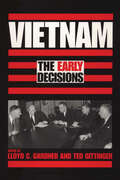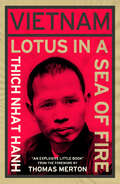- Table View
- List View
Vico's New Science of Ancient Signs: A Study of Sematology
by Jürgen TrabantJürgen Trabant reads the profound insights into human semiosis contained in Vico's 'sematology' as both a spirited rejection of Cartesian philosophy and an early critique of enlightened logocentricism. Sean Ward's translation makes this work available to an English-reading audience for the first time.
Victorian Liberalism: Nineteenth-century political thought and practice (Routledge Revivals)
by Richard BellamyFirst published in 1990, Victorian Liberalism brings together leading political theorists and historians in order to examine the interplay of theory and ideology in nineteenth-century liberal thought and practice. Drawing on a wide range of source material, the authors examine liberal thinkers and politicians from Adam Smith, Jeremy Bentham, and John Stuart Mill to William Gladstone and Joseph Chamberlain. Connections are drawn throughout between the different languages which made-up liberal discourse and the relations between these vocabularies and the political movements and changing social reality they sought to explain. The result is a stimulating volume that breaks new ground in the study of political history and the history of political thought.
Victorian Pain
by Rachel AblowThe nineteenth century introduced developments in science and medicine that made the eradication of pain conceivable for the first time. This new understanding of pain brought with it a complex set of moral and philosophical dilemmas. If pain serves no obvious purpose, how do we reconcile its existence with a well-ordered universe? Examining how writers of the day engaged with such questions, Victorian Pain offers a compelling new literary and philosophical history of modern pain.Rachel Ablow provides close readings of novelists Charlotte Brontë and Thomas Hardy and political and natural philosophers John Stuart Mill, Harriet Martineau, and Charles Darwin, as well as a variety of medical, scientific, and popular writers of the Victorian age. She explores how discussions of pain served as investigations into the status of persons and the nature and parameters of social life. No longer conceivable as divine trial or punishment, pain in the nineteenth century came to seem instead like a historical accident suggesting little or nothing about the individual who suffers.A landmark study of Victorian literature and the history of pain, Victorian Pain shows how these writers came to see pain as a social as well as a personal problem. Rather than simply self-evident to the sufferer and unknowable to anyone else, pain was also understood to be produced between persons—and even, perhaps, by the fictions they read.
Victorian Sensation: The Extraordinary Publication, Reception, and Secret Authorship of Vestiges of the Natural History of Creation
by James A. SecordFiction or philosophy, profound knowledge or shocking heresy? When Vestiges of the Natural History of Creation was published anonymously in 1844, it sparked one of the greatest sensations of the Victorian era. More than a hundred thousand readers were spellbound by its startling vision--an account of the world that extended from the formation of the solar system to the spiritual destiny of humanity. As gripping as a popular novel, Vestiges combined all the current scientific theories in fields ranging from astronomy and geology to psychology and economics. The book was banned, it was damned, it was hailed as the gospel for a new age. This is where our own public controversies about evolution began. In a pioneering cultural history, James A. Secord uses the story of Vestiges to create a panoramic portrait of life in the early industrial era from the perspective of its readers. We join apprentices in a factory town as they debate the consequences of an evolutionary ancestry. We listen as Prince Albert reads aloud to Queen Victoria from a book that preachers denounced as blasphemy vomited from the mouth of Satan. And we watch as Charles Darwin turns its pages in the flea-ridden British Museum library, fearful for the fate of his own unpublished theory of evolution. Using secret letters, Secord reveals how Vestiges was written and how the anonymity of its author was maintained for forty years. He also takes us behind the scenes to a bustling world of publishers, printers, and booksellers to show how the furor over the book reflected the emerging industrial economy of print. Beautifully written and based on painstaking research, Victorian Sensation offers a new approach to literary history, the history of reading, and the history of science. Profusely illustrated and full of fascinating stories, it is the most comprehensive account of the making and reception of a book (other than the Bible) ever attempted. Winner of the 2002 Pfizer Award from the History of Science Society
Victorious Insurgencies: Four Rebellions that Shaped our World
by Anthony James JoesThe author of Resisting Rebellion examines four of the twentieth century&’s most consequential rebellions—in China, Cuba, Afghanistan, and French Indochina. While insurgencies continue to erupt across the globe, most of them fail to meet their intended aims. But in Four Rebellions that Shaped Our World, Anthony James Joes analyzes four successful rebellions which permanently altered the global political arena: the Maoists in China against Chiang Kai-shek and the Japanese in the 1930s and 1940s; the Viet Minh in French Indochina from 1945 to 1954; Castro's followers against Batista in Cuba from 1956 to 1959; and the mujahideen in Soviet Afghanistan from 1980 to 1989. Joes illuminates patterns of failed counterinsurgencies, highlighting their avoidable political and military blunders as well as the critical influence of the international setting. Offering provocative insights that are applicable to twenty-first century geopolitics, this comprehensive study will be of great interest to policy-makers and concerned citizens alike.
Victory: 1946 (Winston S. Churchill War Speeches #4)
by Winston S. ChurchillThe Nobel Prize-winning Prime Minister&’s historic speeches from the final year of WWII are collected in this essential volume. During the final eight months of World War II, Prime Minister Winston Churchill gave some of the most brilliant and consequential speeches of his career. Here are Churchill&’s war status reports delivered to the House of Commons, his rousing statements to the British people, and his global broadcasts, including his announcement of Germany&’s unconditional surrender on May 8th, 1945. These speeches detail Churchill's public reactions to the forming of the United Nations, the death of Roosevelt, the dropping of the Atomic Bomb, and, lastly, the election that defeats him. Perhaps most notable is the "Gestapo" speech of 1945, in which Churchill made a controversial comparison between a Socialist government and the Gestapo—an extremely charged word at that time—that many believe cost him his job as Prime Minister.
Vida contemplativa: Elogio de la inactividad
by Byung-Chul HanUn poderoso llamamiento a abandonar la vida hiperactiva para recuperar el sentido de nuestras vidas, el equilibrio y la riqueza interior. Estamos perdiendo nuestra capacidad de no hacer nada. Nuestra existencia está completamente absorbida por la actividad y, por lo tanto, completamente explotada. Dado que solo percibimos la vida en términos de rendimiento, tendemos a entender la inactividad como un déficit, una negación o una mera ausencia de actividad cuando se trata, muy al contrario, de una interesante capacidad independiente. Byung-Chul Han indaga en los beneficios, el esplendor y la magia de la ociosidad y diseña una nueva forma de vida, que incluya momentos contemplativos, con la que afrontar la crisis actual de nuestra sociedad y frenar nuestra propia explotación y la destrucción de la naturaleza.
A Vida É Maravilhosa: O Caminho para Uma Vida Mais Significativa
by Frank MartelaUm guia inspirador que oferece ferramentas práticas e facilmente aplicáveis para uma experiência de vida mais positiva, gratificante e significativa. O que dá sentido à nossa vida? Como podemos lidar com a ausência de um propósito existencial? Valerá a pena focarmo-nos na busca permanente de felicidade? Perceber o sentido da própria existência é fundamental para vivermos com motivação, satisfação e alegria e, sobretudo, para conseguirmos tirar o máximo partido da vida. Vários estudos sugerem que as pessoas com uma forte noção do seu propósito existencial têm mais saúde e vivem mais e melhor. Neste livro, Frank Martela esclarece por que motivo sentimos uma insatisfação permanente e estamos constantemente à procura de algo mais. Numa série de reflexões perspicazes e motivadoras, dotadas de um refinado sentido de humor, o autor analisa as grandes questões existenciais no contexto da vida moderna, oferecendo uma nova abordagem para alcançarmos uma vida mais plena, que passa por fazermos coisas significativas para nós (realização pessoal)de uma forma que nos torne significativos para outras pessoas (realização social). «Um livro para ler vezes sem conta na viagem de descoberta do nosso propósito.» Daniel H. Pink, autor bestseller internacional «Apoiando-se habilmente em áreas como a psicologia, a filosofia e a literatura, este livro irá ajudá-lo a viver uma vida com significado. Uma leitura tão gratificante e divertida quanto enriquecedora.» Emma Seppala, diretora científica do Centro de Educação e Pesquisa sobre Compaixão e Altruísmo da Universidade de Stanford «Um livro brilhante e encantador que aborda as questões mais grandiosas da vida com simplicidade, humor e perspicácia. Se tem curiosidade sobre o sentido da vida — e quem não tem? —, este livro é um recurso valioso.» Roy F. Baumeister, autor bestseller internacional «Neste ensaio edificante, fruto de um cuidadoso trabalho de pesquisa, Frank Martela reúne algumas das ideias mais fascinantes da história, da filosofia e da psicologia para abordar a questão mais premente de todas: o que torna a vida significativa.» Emily Esfahani Smith, autora bestseller internacional
La vida es un juego: Estrategia para Mario y Blanca
by Carlos MatallanasCarlos Matallanas, exdeportista y querido periodista deportivo afectado por la ELA, nos trae un breve y emocionante ensayo, estructurado a modo de manual de fútbol, sobre la importancia de tener una pasión. LAS REGLAS DE LA VIDA SON COMO LAS REGLAS DEL JUEGO: SE APRENDEN CON LA PRÁCTICA Y FORJAN EL CARÁCTER «Voy a hablaros de lo único que sé de verdad, la única disciplina que me llevó al eureka, donde encontré alguna respuesta crucial, que me hizo ser consciente de que algo, mucho o poco, había comprendido de este tinglado absurdo que llamamos vida». Carlos Matallanas, exdeportista y querido periodista deportivo, nos trae un breve y emocionante ensayo, estructurado a modo de manual de fútbol, sobre la importancia de tener una pasión. Nos habla de la vida como juego y del fútbol como metáfora de la existencia. Desde sus páginas, el autor transmite su amor por el deporte, pero utilizándolo como excusa para filosofar sobre temas como la perseverancia, la empatía, el respeto, la solidaridad o la resiliencia. El fútbol ha dado sentido a su vida, incluso para enfrentarse a su enfermedad, la ELA, que lo tiene inmovilizado en una cama desde la que escribe estas líneas a modo de ensayo para sus sobrinos y para todo aquel que lo quiera leer, «porque siempre habrá un niño mirándote y al que le debes dar el mejor de los testigos: tu ejemplo».
A vida não é útil: Ideias para salvar a Humanidade
by Ailton KrenakNum momento em que a Humanidade atravessa uma prova de fogo, a lucidez e desassombro de Ailton Krenak, um dos mais originais e importantes pensadores da actualidade, obrigam-nos a uma importante reflexão. A pandemia de coronavírus que o mundo atravessa é apenas um dos vários desafios que enfrentamos hoje. Quando analisada, percebemos que é apenas um sintoma de uma doença maior: se a forma predatória e consumista como lidamos provocou esta pandemia, o autoritarismo e desprezo pela vida humana de alguns governos, transformou-a numa autêntica tragédia para muitos. Em A vida não é útil, ideias para salvar a Humanidade, Krenak, um dos mais originais e importantes pensadores da actualidade, pensa sobre o caminho em direcção à ruína que a Humanidade insiste em tomar e crítica as tendências destrutivas a que nos entregamos em nome de uma suposta "civilização": o consumismo desenfreado, a devastação ambiental e o primado da economia face ao valor da vida. «Ninguém come dinheiro», «O amanhã não está à venda» e «A vida não é útil» são, além de capítulos deste livro, verdades implacáveis e avisos impossíveis de ignorar do filósofo indígena. É urgente ler Ailton Krenak e pensar com ele uma Humanidade melhor, um outro caminho, radicalmente diferente. Por um futuro que ainda não está perdido, precisam-se ideias para salvar a Humanidade.
Una vida sin ayer
by Edoardo NesiEdoardo Nesi, fiel a su estilo, recurre una vez más a su particular estilo, mezcla de testimonio, análisis y elaboración narrativa, para dirigir hacia el futuro una mirada convincente, cargada de entusiasmo e ilusión, sin la rémora de la nostalgia por un pasado esplendoroso que sabemos irrepetible. El relato comienza con un repaso a los días de gloria de una industria próspera, del prestigio del «Made in Italy», hasta la irrupción de una crisis que parece haber agotado la riqueza y el bienestar de un país. En este punto, se presentan dos posibilidades: abandonarse a la contemplación del ocaso o buscar en el presente los elementos para empezar a construir un futuro mejor. Nesi elige esta segunda vía y se dirige a los hijos, a los jóvenes en quienes recaerá la responsabilidad de levantar el país. Una generación que heredará un mundo más pobre que el que recibieron de sus padres, además de una realidad profundamente diversa, arbitraria y cambiante. Ellos deberán olvidar el ayer para atacar el mañana; necesitarán armarse de ideas renovadas -que sus padres ni siquiera deberían intentar comprender- para convertirlas en realidades, y el pasado sólo les servirá para descifrar el presente y proyectar un nuevo porvenir. Imaginar una sociedad que no se base en la avaricia y el individualismo sino en las ideas, en la capacidad emprendedora y en la generosidad es el alegato de Edoardo Nesi, un mensaje que no puede dejar indiferente a ningún lector comprometido y preocupado por la situación actual. Reseñas:«Un texto que nos agarra por las solapas y nos arrastra, con la potencia de una escritura de alta intensidad, que nos conduce a interrogarnos y reflexionar [...] sobre la Italia que se ha terminado y sobre cómo enderezarla.»TTL, La Stampa «Nesi es un apasionado estudioso del alma humana [...]. La modernidad de su posición intelectual le impide quedarse atascado en la contemplación de un mundo que va a la deriva.»La Sicilia «Narración [...] y panfleto combinados con gran fuerza y tensión comunicativa.»Il Messaggero «Una vida sin ayer propone una receta para salir del abismo que relata en La historia de mi gente. En sus páginas vuelven a mezclarse con fluidez la narración, la crónica, el ensayo, el panfleto y la autobiografía.»Panorama «Una prosa cálida, espontánea, sin neurosis demostrativas [...] alejada de cualquier retórica y al mismo tiempo ambiciosa y visionaria.»La Repubblica «Un mensaje políticamente incorrecto con respecto al buenismo imperante. Un título con capacidad de convertirse en el emblema de una generación.»La Nazione Firenze
Videobasierte Kompetenzmessung in der universitären Lehrkräfteausbildung: Evidenz aus Literaturreviews und empirischen Untersuchungen (Perspektiven der Mathematikdidaktik)
by Jonas WeyersInnerhalb der Forschung zur professionellen Kompetenz von Lehrkräften kommen vermehrt videobasierte Kompetenzmessungen zum Einsatz. Durch die Kombination von Videomaterial unterrichtlicher Praxis mit spezifischen Testfragen sollen Rückschlüsse auf handlungsnahe Kompetenzen bzw. sogenannte situationsspezifische Fähigkeiten von Lehrkräften ermöglicht werden. Auf Basis von zwei Literaturreviews untersucht die vorliegende Arbeit die Konzeption und Erfassung situationsspezifischer Fähigkeiten am Beispiel des Konstrukts "Teacher Noticing", welches in der mathematikdidaktischen Forschung besonders verbreitet ist, und gibt einen umfassenden Überblick zu vorliegenden Testinstrumenten, die auf dieses Konstrukt abzielen. Insbesondere wird diskutiert, inwieweit unterschiedliche Messansätze zu vergleichbaren Ergebnissen führen und welche Konsequenzen sich aus der Heterogenität der Messansätze für den wissenschaftlichen Diskurs ergeben. Anhand zweier empirischer Arbeiten wird weiterführend geprüft, inwieweit anspruchsvolle videobasierte Kompetenzmessungen bereits mit Lehramtsstudierenden einsetzbar sind und Rückschlüsse auf deren Kompetenzentwicklung zulassen. Die Ergebnisse stützen dabei grundsätzlich die Einsetzbarkeit in der universitären Phase der Lehrkräfteausbildung, wobei sich nur geringe Zusammenhänge zu den Lerngelegenheiten innerhalb dieses Ausbildungsabschnitts zeigen.
Videolised Society
by Jian Meng Hui ZhaoThis book traces the development of video (especially short video, duan shipin) in China over the past few years, exploring how these videos engaged with China’s rapidly changing society, how they enriched existed theories of society, media and communication, and new theories to be extracted. The book offers a new, critical model for understanding the relationship between video, video theory, video industry and the State. This book sheds light on the overall description and explanation of the current socio-political, economic and cultural environment concerning the development of video (especially short video). It interprets the emergence of the “Social Videolization” through the subjects of media psychology, communication studies and cultural criticism, media industrial studies, sociology and anthropology.
Videophilosophy: The Perception of Time in Post-Fordism (Columbia Themes in Philosophy, Social Criticism, and the Arts)
by Maurizio LazzaratoThe Italian philosopher Maurizio Lazzarato has earned international acclaim for his analysis of contemporary capitalism, in particular his influential concept of immaterial labor and his perceptive writings on debt. In Videophilosophy, he reveals the underpinnings of contemporary subjectivity in the aesthetics and politics of mass media. First written in French and published in Italian and later revised but never published in full, this book discloses the conceptual groundwork of Lazzarato’s thought as a whole for a time when his writings have become increasingly influential.Drawing on Bergson, Nietzsche, Benjamin, Deleuze and Guattari, and the film theory and practice of Dziga Vertov, Lazzarato constructs a new philosophy of media that ties political economy to the politics of aesthetics. Through his concept of “machines that crystallize time,” he argues that the proliferation of digital technologies over the past half-century marks the transition to a new mode of capitalist production characterized by unprecedented forms of subjection. This new era of the commodification of the self, Lazzarato declares, demands novel types of political action that challenge the commercialization and exploitation of time. This crucial text by an essential contemporary thinker offers vital new perspectives on aesthetics, politics, and media and critical theory.
Viele Welten
by Peter ByrnePeter Byrne erzählt die Lebensgeschichte von Hugh Everett III (1930-1982), dessen Theorie der multiplen Universen die Physik und Philosophie entscheidend beeinflusst hat. Neben seiner berühmten Interpretation der Quantenmechanik verfasste Everett eine klassische Arbeit zur Spieltheorie, entwickelte wegweisende Computeralgorithmen und leistete Pionierarbeit auf dem Gebiet der Künstlichen Intelligenz. Diesem anschaulichen Porträt liegen bisher unveröffentlichte Schriften Everetts zugrunde sowie Interviews mit Freunden, Kollegen und Verwandten.
Vielfalt und Einheit der Kritischen Theorie – Kulturwissenschaftliche Perspektiven
by Oliver KozlarekDie in diesem Buch versammelten Arbeiten gehen der Frage nach, ob die Tradition der Kritischen Theorie mit ihrer multifokalen und vor allem interdisziplinären kritischen Sozialforschung dem Anspruch einer übergreifenden politischen wie wissenschaftlichen Praxis der Kritik für unsere aktuellen Gesellschaften gerecht wird. Es geht somit auch um eine „Aktualisierung“ der Kritischen Theorie. Diese soll aber gerade nicht durch das Herausarbeiten eines neuen Begriffsinstrumentariums diagnostischer und/oder normativer Art geschehen, sondern dadurch, dass ganz im Sinne des interdisziplinären Forschungsansatzes der Kritischen Theorie unsere hochkomplexen spätmodernen Gesellschaften als Räume transparent werden, in denen sich unterschiedliche Erfahrungslinien kreuzen.
Vielvölkerstaat Äthiopien: Zu den historischen Ursachen von Krieg und Frieden in Äthiopien (essentials)
by Rainer TetzlaffDas Essential analysiert die historischen Ursachen von Krieg und Frieden in Äthiopien im Kontext von Reichsgründung und Modernisierung seit der Mitte des 19. Jahrhunderts. Es stellt die aktuellen Rivalitäten zwischen den Völkern der Tigray, Eritreer, Amharen und Oromo seit der Abschaffung der Monarchie 1974 in den Vordergrund und diskutiert die politischen Aussichten auf Frieden und interethnische Versöhnung unter der Herrschaft des amtierenden Premierministers Abiy Ahmed – Friedensnobelpreisträger und Kriegsherr zugleich.
The Vienna Circle: The Origins of Neo-Positivism
by Victor KraftJoin original Vienna Circle member Victor Kraft in his discussion of the movement for an exclusive insider&’s view of this important point in philosophical history. In this in-depth philosophical study, Victor Kraft explores the role the Vienna Circle had on the international philosophical movement. The Vienna Circle constituted a point of departure for the reawaking, rebirth, and reformation of positivism and empiricism, leading to the creation of the Neo-positivism movement. At the time of The Vienna Circle&’s publication in the 1950s, the Neo-positivism movement stood in the foreground of contemporary philosophy, and it was quite possibly the most significant serious philosophical movement in the period between the two world wars. Making Kraft&’s study of Neo-positivism available to a world audience, Arthur Pap provides a rich and accessible translation from the original German. The book contains detailed expositions, accompanied here and there by criticism, of the Vienna Circle&’s views on the criteria of significance, the nature of logic and mathematics, the phenomenalist analysis of physical concepts, the verification-basis of scientific propositions, the meaning of probability, physicalism, and much more.
The Vienna Circle: The Origins of Neo-Positivism
by Victor KraftA member of the elite group who helped forge the logical positivism movement delves into the intellectual world of early-twentieth-century Vienna. Drawing together some of the greatest minds in Europe during the 1920s and 30s, the Vienna Circle had a profound influence on contemporary science and philosophy. Thinkers such as Moritz Schlick, Gustav Bergmann, and Karl Menger met regularly at the University of Vienna to discuss the philosophy of science, taking inspiration from such pioneering works as Ludwig Wittgenstein&’s Tractatus Logico-Philosophicus and Alfred North Whitehead and Bertrand Russell&’s Principia Mathematica. In this in-depth study, Vienna Circle member Victor Kraft explores this group&’s role in the development of modern thought. The Vienna Circle constituted a point of departure for the rebirth and reformation of positivism and empiricism, leading to the creation of the Neo-positivism movement. At the time of publication in the 1950s, the neopositivism movement stood in the foreground of contemporary philosophy, and it was quite possibly the most significant philosophical movement between the two world wars. Making Kraft&’s study of neopositivism available to a world audience, Arthur Pap provides a rich and accessible translation from the original German publication.</
The Vienna Circle: The Story of Logical Empiricism
by Sahotra SarkarIn Vienna in the 1920s a group of brilliant philosophers, mathematicians, and scientists – led by figures such as Moritz Schlick, Otto Neurath, Rudolf Carnap, and Hans Hahn – gathered to discuss the foundations of science and mathematics. Known as the Vienna Circle, they proposed to practice philosophy in continuity with science; their movement became known as Logical Empiricism.In this highly engaging book, Sahotra Sarkar tells the story of one hundred years of Logical Empiricism, from its beginnings in 1924 to its legacy today. He explains how its ideas, influenced by revolutionary theories of space, time, and causality of that time, led to a quest for a unified theory of science. He shows how their commitment to logic and objectivity provided a powerful political antidote to Nazi racism and obscurantism. He charts the decline of the movement after many members, who had fled to the United States during World War Two, were presumed to have communist sympathies and subjected to surveillance and harrassment. He argues that the ideas of the movement continue to be relevant today.A superb evocation of one of the most important intellectual movements of the twentieth century, The Vienna Circle: The Story of Logical Empiricism will be of great value to anyone interested in philosophy, history, and the history of science.
The Vienna Circle
by Friedrich StadlerThis abridged and revised edition of the original book (Springer-Wien-New York: 2001) offers the only comprehensive history and documentation of the Vienna Circle based on new sources with an innovative historiographical approach to the study of science. With reference to previously unpublished archival material and more recent literature, it refutes a number of widespread clichés about "neo-positivism" or "logical positivism". Following some insights on the relation between the history of science and the philosophy of science, the book offers an accessible introduction to the complex subject of "the rise of scientific philosophy" in its socio-cultural background and European philosophical networks till the forced migration in the Anglo-Saxon world. The first part of the book focuses on the origins of Logical Empiricism before World War I and the development of the Vienna Circle in "Red Vienna" (with the "Verein Ernst Mach"), its fate during Austro-Fascism (Schlick's murder 1936) and its final expulsion by National-Socialism beginning with the "Anschluß" in 1938. It analyses the dynamics of the Schlick-Circle in the intellectual context of "late enlightenment" including the minutes of the meetings from 1930 on for the first time published and presents an extensive description of the meetings and international Unity of Science conferences between 1929 and 1941. The chapters introduce the leading philosophers of the Schlick Circle (e. g. , Hans Hahn, Otto Neurath, Rudolf Carnap, Philipp Frank, Felix Kaufmann, Edgar Zilsel) and describe the conflicting interaction between Moritz Schlick and Otto Neurath, the long term communication between Moritz Schlick, Friedrich Waismann and Ludwig Wittgenstein, as well as between the Vienna Circle with Heinrich Gomperz and Karl Popper. In addition, Karl Menger's "Mathematical Colloquium" with Kurt Gödel is presented as a parallel movement. The final chapter of this section describes the demise of the Vienna Circle and the forced exodus of scientists and intellectuals from Austria. The second part of the book includes a bio-bibliographical documentation of the Vienna Circle members and for the first time of the assassination of Moritz Schlick in 1936, followed by an appendix comprising an extensive list of sources and literature.
The Vienna Circle and Religion (Vienna Circle Institute Yearbook #25)
by Esther RamharterThis book is the first systematic and historical account of the Vienna Circle that deals with the relation of logical empiricists with religion as well as theology. Given the standard image of the Vienna Circle as a strong anti-metaphysical group and non-religious philosophical and intellectual movement, this book draws a surprising conclusion, namely, that several members of the famous Moritz Schlick-Circle - e.g., the left wing with Rudolf Carnap, Otto Neurath, Philipp Frank, Edgar Zilsel, but also Schlick himself - dealt with the dualisms of faith/ belief and knowledge, religion and science despite, or because of their non-cognitivist commitment to the values of Enlightenment. One remarkable exception was the philosopher and Rabbi Joseph Schächter, who wrote explicitly on religion and philosophy after the linguistic turn. The book also covers another puzzling figure: the famous logician Kurt Gödel, who wrote on theology and the ontological proof of God in his so far unpublished notebooks. The book opens up new perspectives on the Vienna Circle with its internal philosophical and political pluralism and is of value to philosophers, historians and anybody who is interested in the relation between science and religion.
The Vienna Circle in Czechoslovakia (Vienna Circle Institute Yearbook #23)
by Radek SchusterThis book explores the remarkable interconnections of the Czechoslovak environment and the work and legacy of the Vienna Circle on the philosophical, scientific and artistic level. The Czech lands and later Czechoslovakia were the living and working space for the predecessors and catalysts for Logical Empiricism, such as Bernard Bolzano, Ernst Mach and Albert Einstein, along with key figures in the Vienna Circle such as Philipp Frank and Rudolf Carnap. Moreover, Prague hosted important academic events in which Logical Empiricism was presented to the public, such as the September 1929 1st Conference on the Epistemology of the Exact Sciences, which launched the key manifesto, The Vienna Circle. The Scientific Conception of the World. In addition, this book investigates both the positive and negative receptions of Logical Empiricism within Czech and Slovak intellectual circles. The volume features a selection of contributions to the international conference, The Vienna Circle in Czechoslovakia, held in Pilsen, Czech Republic, in February 2015. These essays are supplemented by two texts of vivid personal memoirs by Nina Holton and Ladislav Tondl. The book is of interest to scholars and researchers interested in the history of philosophy and science in central Europe and the philosophy of science and the Logical Empiricism of the Vienna Circle.
Vietnam: The Early Decisions
by Lloyd C. Gardner and Ted GittingerThis anthology examines the turmoil and conflicting advice that led the US into Vietnam and the roles played by Presidents Kennedy and Johnson. For many Americans, Oliver Stone&’s film JFK left no doubt that before his assassination Kennedy had determined to quit Vietnam. Yet the historical record offers a more complex view. In this fresh look at the archival evidence, noted scholars take up the challenge to provide us with their conclusions about the early decisions that put the United States on the path to the greatest American tragedy since the Civil War. The book is divided into four sections. Parts one and two delve into the political and military contexts of the early decisions. Part three raises the intriguing questions of Kennedy&’s and Johnson's roles in the conflict, particularly the thorny issue of whether Kennedy did, in fact, intend to withdraw from Vietnam and whether Johnson reversed that policy. Part four reveals an uncanny parallel between early Soviet policy toward Hanoi and US policy toward Saigon.
Vietnam: A Buddhist Proposal for Peace
by Thich Nhat HanhThis stunning commentary on the cultural and political background to the war in Vietnam resonates deeply as the first work of Vietnamese writer, peace activist, and Buddhist monk Thich Nhat HanhThis rare book from 1967 is one of the very few written in English giving a Vietnamese perspective on the Indochina Wars. Many years ahead of its time, Vietnam: Lotus in a Sea of Fire will be welcomed by historians and readers of contemporary Vietnamese narratives. As war raged in Vietnam, the Zen monk Thich Nhat Hanh became a leading figure in the Buddhist peace movement. With the help of friends like Catholic monk Thomas Merton, he published Vietnam: Lotus in a Sea of Fire in 1967 in the US (and underground in Vietnam as Hoa Sen Trong Biển Lửa), his uncompromising and radical call for peace. It gave voice to the majority of Vietnamese people who did not take sides and who wanted the bombing to stop. Thomas Merton wrote the foreword, believing it had the power to show Americans that the more America continued to bomb Vietnam, the more communists it would create. This was Thich Nhat Hanh's first book in English and made waves in the growing anti-war movement in the United States at the time. Thich Nhat Hanh's portrayal of the plight of the Vietnamese people during the Indochina Wars is required reading now as the United States and Europe continue to grapple with their roles as global powers—and the human effects of their military policies. Vietnam: Lotus in a Sea of Fire is of special interest for students of peace and conflict studies and Southeast Asian history. It also gives the reader insights into the thought of the young Thich Nhat Hanh, who would later go on to found--in exile--Plum Village in France, the largest Buddhist monastery outside Asia, and influence millions with his teachings on the path of peace and mindfulness.
